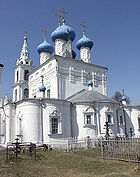
Pushkino, Moscow Oblast
Encyclopedia

Pushkinsky District, Moscow Oblast
Pushkinsky District, Moscow Oblast is an administrative and municipal district , one of the 38 in Moscow Oblast, Russia....
of Moscow Oblast
Moscow Oblast
Moscow Oblast , or Podmoskovye , is a federal subject of Russia . Its area, at , is relatively small compared to other federal subjects, but it is one of the most densely populated regions in the country and, with the 2010 population of 7,092,941, is the second most populous federal subject...
, Russia
Russia
Russia or , officially known as both Russia and the Russian Federation , is a country in northern Eurasia. It is a federal semi-presidential republic, comprising 83 federal subjects...
, located at the confluence
Confluence
Confluence, in geography, describes the meeting of two or more bodies of water.Confluence may also refer to:* Confluence , a property of term rewriting systems...
of the Ucha
Ucha River
Ucha River is a river in Moscow Oblast, Russia. It is a left tributary of the Klyazma River.The Ucha is 42 km in length, with a drainage basin of 605 km². It flows through the towns of Pushkino and Ivanteyevka, and flows into the Klyazma River at the town of Shchyolkovo.Tributaries:...
and Serebryanka Rivers, 30 kilometres (18.6 mi) northeast of Moscow
Moscow
Moscow is the capital, the most populous city, and the most populous federal subject of Russia. The city is a major political, economic, cultural, scientific, religious, financial, educational, and transportation centre of Russia and the continent...
. Population: 57,000 (1974); 30,000 (1959); 21,000 (1939).
According to one of the historic versions, the village of Pushkino was first documented in 1499 when it belonged to Grigory Morkhinin "Pushka", a boyar
Boyar
A boyar, or bolyar , was a member of the highest rank of the feudal Moscovian, Kievan Rus'ian, Bulgarian, Wallachian, and Moldavian aristocracies, second only to the ruling princes , from the 10th century through the 17th century....
whose male-line descendants include Aleksandr Pushkin
Aleksandr Pushkin
Alexander Sergeyevich Pushkin was a Russian author of the Romantic era who is considered by many to be the greatest Russian poet and the founder of modern Russian literature....
, a poet whose statue graces one of the town's main squares. During the following centuries, the neighbourhood evolved into a favoured summer retreat of Russian nobility
Russian nobility
The Russian nobility arose in the 14th century and essentially governed Russia until the October Revolution of 1917.The Russian word for nobility, Dvoryanstvo , derives from the Russian word dvor , meaning the Court of a prince or duke and later, of the tsar. A nobleman is called dvoryanin...
. In 1678, a five-domed church of Saint Sergius was built at the manor of Komyagino. (picture). Another notable estate is Muranovo
Muranovo
Muranovo is the Fyodor Tyutchev state museum located in Pushkino, Moscow Oblast, Russia.The estate was founded in 1816 and since then has belonged to four families, including Fyodor Tyutchev's family. Its main house was built in wood in 1842 by Yevgeny Baratynsky, another renowned Russian poet...
, where the Russian poets Evgeny Baratynsky
Evgeny Baratynsky
Yevgeny Abramovich Baratynsky was lauded by Alexander Pushkin as the finest Russian elegiac poet. After a long period when his reputation was on the wane, Baratynsky was rediscovered by Anna Akhmatova and Joseph Brodsky as a supreme poet of thought.- Life :Of noble ancestry, Baratynsky was...
and Fyodor Tyutchev
Fyodor Tyutchev
Fyodor Ivanovich Tyutchev is generally considered the last of three great Romantic poets of Russia, following Alexander Pushkin and Mikhail Lermontov.- Life :...
used to spend their summers. A dacha
Dacha
Dacha is a Russian word for seasonal or year-round second homes often located in the exurbs of Soviet and post-Soviet cities. Cottages or shacks serving as family's main or only home are not considered dachas, although many purpose-built dachas are recently being converted for year-round residence...
of Vladimir Mayakovsky
Vladimir Mayakovsky
Vladimir Vladimirovich Mayakovsky was a Russian and Soviet poet and playwright, among the foremost representatives of early-20th century Russian Futurism.- Early life :...
, who lived in Pushkino during summer seasons of 1920-1928 is also a museum
Museum
A museum is an institution that cares for a collection of artifacts and other objects of scientific, artistic, cultural, or historical importance and makes them available for public viewing through exhibits that may be permanent or temporary. Most large museums are located in major cities...
. Pushkino was granted town status in August 1925. Today it is notable for its Institute of Forest Science, one of the few in Russia.
Twin towns/sister cities
Pushkino is twinnedTown twinning
Twin towns and sister cities are two of many terms used to describe the cooperative agreements between towns, cities, and even counties in geographically and politically distinct areas to promote cultural and commercial ties.- Terminology :...
with: Bert, Germany Kutná Hora
Kutná Hora
Kutná Hora is a city in Bohemia, now the Czech Republic in the Central Bohemian Region.-History:The town began in 1142 with the settlement of the first Cistercian Monastery in Bohemia, Kloster Sedlitz, brought from the Imperial immediate Cistercian Waldsassen Abbey...
, Czech Republic
Czech Republic
The Czech Republic is a landlocked country in Central Europe. The country is bordered by Poland to the northeast, Slovakia to the east, Austria to the south, and Germany to the west and northwest....
Orivesi
Orivesi
Orivesi is a town and a municipality of Finland. It was founded in 1865.It is located in the province of Western Finland and is part of the Pirkanmaa region. The municipality has a population of and covers an area of of which is water. The population density is .The municipality is unilingually...
, Finland
Finland
Finland , officially the Republic of Finland, is a Nordic country situated in the Fennoscandian region of Northern Europe. It is bordered by Sweden in the west, Norway in the north and Russia in the east, while Estonia lies to its south across the Gulf of Finland.Around 5.4 million people reside...

